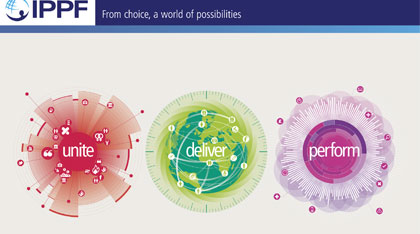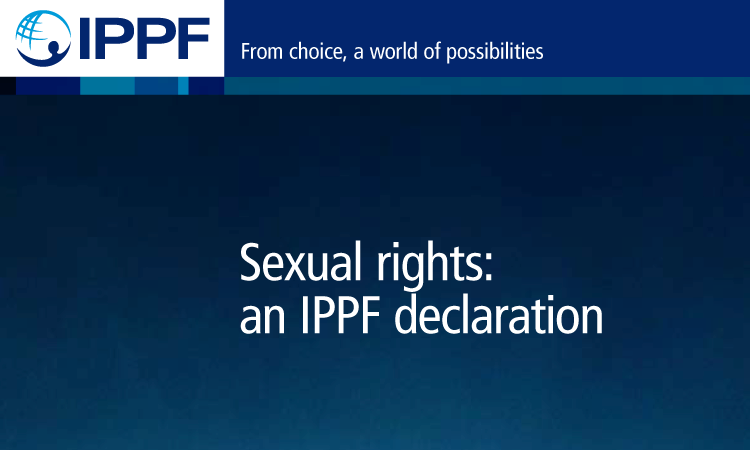Spotlight
A selection of resources from across the Federation

HIV Theory of Change
Our HIV Theory of Change is to clarify the goals and vision of IPPF’s HIV programme and to articulate the different pathways and strategies IPPF uses to contribute towards its HIV goals and vision.
Filter our resources by:


| 06 July 2012
Annual Performance Report 2011-12
2012 is IPPF’s 60th year. The Annual Performance Report confirms, once again, IPPF’s vital role in human development. It opens with an overview of the external challenges that threaten sexual and reproductive health and rights (SRHR). Despite these challenges, IPPF continues to deliver impressive results. In 2011, Member Associations contributed to 116 policy and/or legislative changes in support or defence of sexual and reproductive health and rights (SRHR). The Federation as a whole provided 89.6 million SRH services with the majority going to the poor and vulnerable, including young people. Robust systems and processes have ensured that money has been invested cost-effectively where it is most needed.
| 12 June 2012
At a Glance 2010
Key facts and figures highlighting IPPF's achievements in 2009. Sexual and reproductive ill health causes over 30% of the global burden of disease among women of childbearing age and without IPPF, this burden would be even greater.
| 29 May 2012
IPPF Strategic Framework: 2005 - 2015
The product of a Federation-wide consensus, this framework brings together the ideas and experience of IPPF Member Associations, senior volunteers, Regional Offices and Central Office, and has been approved by the Governing Council. By combining an understanding of our past with a vision for our future, this new plan presents a 'framework of opportunity' that Member Associations can interpret to develop the most appropriate response to specific sexual and reproductive health challenges. The ‘Strategic Framework’ is not intended to impose a rigid set of rules or constraints. Rather, it embraces the diversity of situations Member Associations and regions face. While providing this flexibility, the framework unites the Federation in a common vision on which we are compelled to act if we are to meet the needs of women, men and young people throughout the world.

| 03 May 2012
IPPF Sexual Rights Declaration Pocket Guide

| 02 May 2012
Sexual Rights: An IPPF declaration (abridged)
The IPPF declaration is grounded in and informed by international agreements such as United Nations Conventions. This abridged version to be used in conjunction with IPPF's original Sexual Rights Declaration.

| 25 May 2011
Sexual Rights: An IPPF declaration
Sexuality is a natural and precious aspect of life, an essential and fundamental part of our humanity. For people to attain the highest standard of health, they must first be empowered to exercise choice in their sexual and reproductive lives; they must feel confident and safe in expressing their own sexual identity. Today, discrimination, stigma, fear and violence pose real threats to many people. These threats and the actions they trigger – ranging from disheartening to life-threatening in nature – prevent many people from attaining basic sexual rights and health. IPPF is committed to fulfilling its goals through an approach that embodies the principles of universality, interrelatedness, interdependence and indivisibility of all human rights. We will do all we can to ensure that sexual rights – human rights – are respected through our own service provision and advocacy, and also in the wider public sphere. Sexual Rights: An IPPF Declaration represents the culmination of more than two years of work that spanned the globe. Its development was guided by a diverse group of individuals: internationally-renowned experts in sexual and reproductive health, human rights, law and public health; senior IPPF volunteers, each of whom brought unique regional perspectives and who together represented a range of experience and strengths; and three senior directors of the IPPF secretariat. The Declaration developed through regional meetings and events that took place across the Federation and built on the IPPF Charter of Sexual and Reproductive Rights. While there has already been some progress toward meeting the Millennium Development Goals and the targets of the 1994 ICPD (International Conference on Population and Development) Programme of Action, there is still much work to be done. Sexual rights are a component of human rights, they are an evolving set of entitlements related to sexuality that contribute to the freedom, equality and dignity of all people, and they cannot be ignored. We must persevere; we must be uncompromising and passionate in our efforts to decrease stigma and improve access to services, and to increase recognition of sexuality as a positive aspect of human life. Marginalized groups such as young people, transgender people, sex workers, men having sex with men, people who are gay, lesbian or bi-sexual, child brides and girl mothers particularly need our compassion. The Declaration applies equally to girls and women who are vulnerable to or have been subjected to gender-based violence, including traditional norms such as female genital mutilation and discrimination based on male preference. Sexual Rights: An IPPF Declaration is an indispensable tool for all organizations, activists, researchers, policy- and decision-makers who are working to promote and ensure human rights. The Declaration will enable members of the sexual and reproductive health and human rights communities to create change and build on the momentum that has already begun around sexual rights in preparation for the next International Conference on Population and Development in 2015. Too often denied and too long neglected, sexual rights deserve our attention and priority. It is time to respect them. It is time to demand them. We trust that the Declaration will serve you well on the journey ahead.















